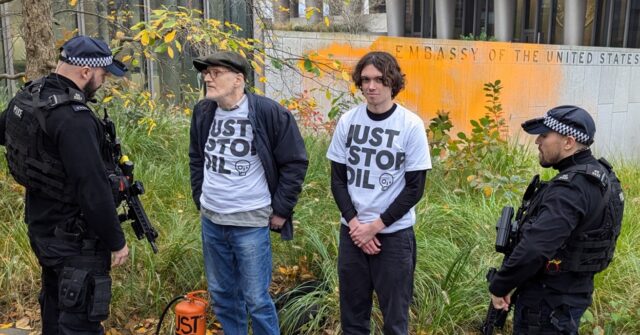Activists from the British direct action group Just Stop Oil made headlines on Wednesday morning when they vandalized the front of the U.S. embassy in London by spraying bright orange paint on its limestone facade. This act of protest was framed as a direct response to the results of the 2024 U.S. Presidential Election, which saw former President Donald Trump declared the winner. The group, known for its hard-left stance, issued a statement claiming that the true victors of this electoral process were the “corporate power” and “the fossil fuel industry” that they argue dominate both major political parties in the United States. By targeting the U.S. embassy, the activists intended to highlight their discontent with these systemic issues, asserting that the election results further entrenched the power of harmful industries over political decision-making and ultimately endangered global climate health.
In their statement, Just Stop Oil characterized Trump as a “fake populist.” The group accused him of exploiting the widespread discontent among the electorate without addressing what they deem the most pressing issue of our time: the urgent need to terminate oil and gas drilling practices that contribute to climate change. This sentiment reflects a broader critique of mainstream political figures in the West, who they argue perpetuate a façade of choice while failing to deliver on crucial reforms. The urgency of their message was underscored by their call for ordinary citizens to mobilize and dismantle entrenched political systems, stating that “no political leaders are coming to save us.” This advocacy is indicative of a rising frustration among certain activist groups who feel that traditional political avenues have become ineffective in the face of urgent climate crises.
Among the individuals involved in the protest was Joseph Aggarwal, a 25-year-old activist who articulated a left-wing-populist critique of the current political landscape. He lamented the lack of distinguishing features among political parties, suggesting that voters across the Western world often find themselves faced with choices that ultimately lead to similar outcomes in policy and governance. Aggarwal argued that whether citizens supported Democrats or Republicans, they were subject to a relentless onslaught against their living conditions. The sentiment echoed by Aggarwal signifies a rising awareness among many voters that traditional political structures may serve the interests of a wealthy elite rather than the majority of the populace.
With Trump’s electoral victory in 2024, which reportedly garnered the support of over 70 million voters, Just Stop Oil’s actions exemplify a reaction that reflects broader fears about the implications of his presidency. Many within the activist group viewed his re-election as a symptom of a systemic failure, wherein both established parties perpetuate inequality and environmental degradation. The assertion that Trump, characterized as a “bad actor” by Aggarwal, exploits public discontent to benefit the billionaire class speaks to a growing narrative within leftist movements in the U.S. and abroad. This narrative posits that contemporary elections are not simply about political preferences but are instead contests that reinforce socio-economic disparities and environmental neglect.
The vandalism at the embassy, although met with immediate police response leading to the detainment of an activist, serves to reignite discussions about the efficacy of direct action as a form of political expression. Just Stop Oil’s tactics are indicative of a broader trend among activists who believe significant change cannot await leisurely electoral cycles or political compromises. By utilizing dramatic forms of protest, such as vandalizing a prominent symbol of U.S. power, they hope to spark conversation and mobilization around the climate crisis, which they consider to be an existential threat. The act, while controversial, underlines the lengths to which some groups feel compelled to go when they perceive that the political establishment is failing to address pressing social and environmental issues.
Overall, Just Stop Oil’s protest reflects a critical intersection of environmental activism and electoral politics that resonates across multiple global contexts. As climate change increasingly dominates discourses around social justice and inequality, groups like Just Stop Oil are likely to continue employing direct actions to provoke awareness and catalyze change. Their recent engagement with the U.S. election serves as a reminder of the interconnectedness of global politics and local activism, as well as the urgent need for comprehensive responses to the challenges posed by climate change and the fossil fuel industry’s grip on political systems. Activists argue that only through sustained public pressure and collective grassroots organizing can meaningful shifts occur in policy and practice, underscoring a profound call for democratic renewal in an era marked by increasing political polarization.

